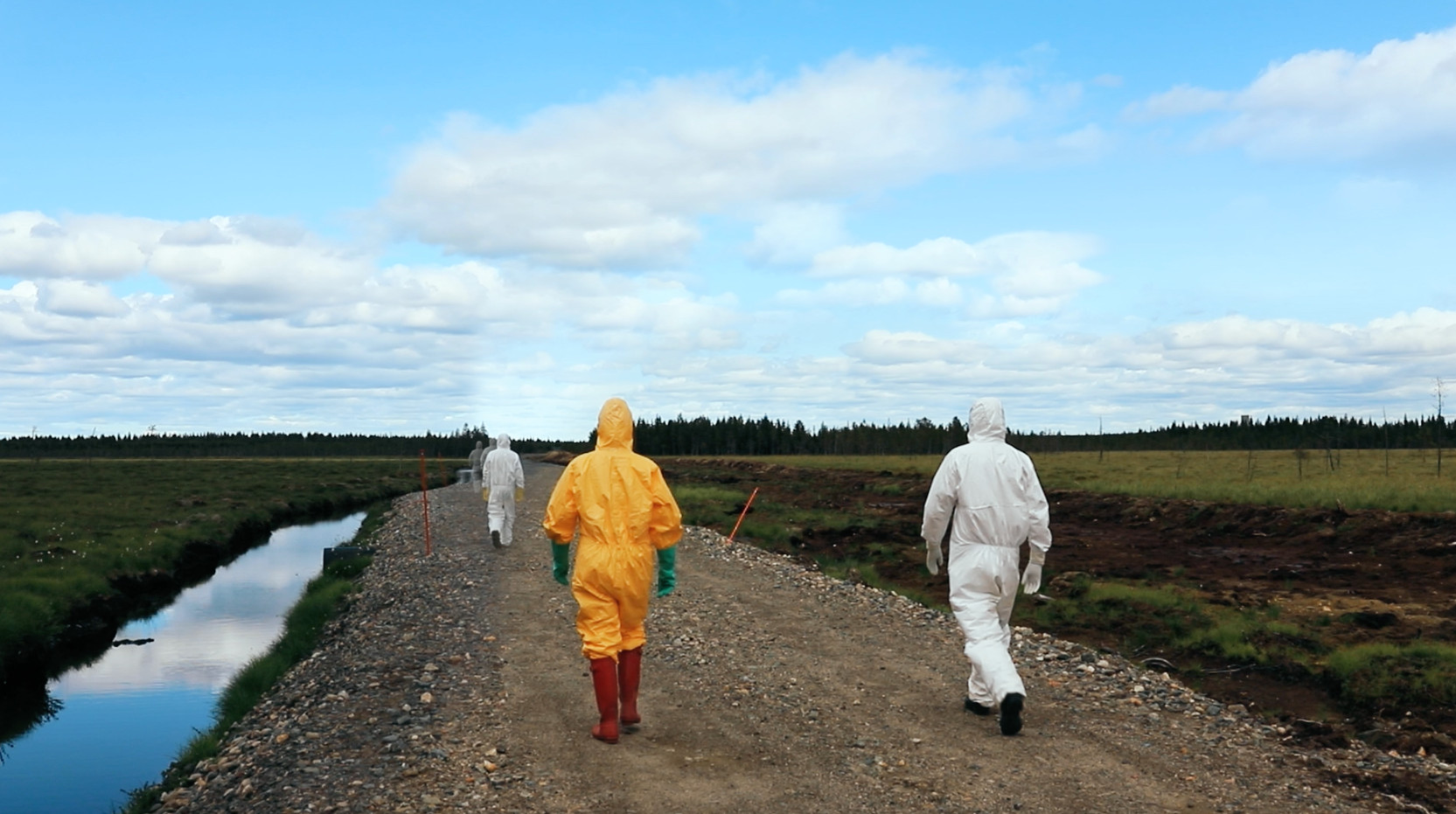
Flowing Waters collective, 2022, still image from the video work "Twenty-Five Kilometer Walk".
RUUKKU CALL: Artivism
Dismantling the contemporary conception of art has enabled a space where conceptions of art, ideals produced by art, working methods, and contents have changed. This space also enables negotiations and struggles between various conceptions of art. The art-historical contexts of activist art are rooted in feminist and avant-garde art and in the anti-war and anti-racist civil rights movements of the 1960s. Suohpanterror, a group operating in Arctic communities, is the epitome of activist art. The group seeks to draw attention to the rights of the Sámi people and grievances they experience, such as colonialism, racism, and the exploitation of the Sápmi, the Sámi homeland. Politically transformative and critical art plays a central role in fights for social justice, such as environmental rights, gender diversity, and antiracism. Activist art, being often radical, searching for something new, and integrating environments, is tied to power-knowledge relations. In this issue, we approach artivism as performative art, which is related to questions of power, matter, and representation as well as their relations. We focus on the fact that art, in its various creative forms, includes political objectives. At the same time, we explore the ways how political action can be creative. Artivism, based on the interests of a researcher, artist, activist, or various communities, may be connected with personal and political objectives related to subjugation, resistance, and empowerment. Activism as a form of artistic practice may also be quiet, tentative, experimental, and searching. Sometimes, it leads to social changes. At other times, it appears as slow, nearly invisible movements and powers.
The Artivism issue's research expositions may address the following questions:
• Artivism and the chance for social change
• Gender, corporeality, class, and race in activist art
• Gender-based violence
• Environmental issues
• Rights of indigenous people
• Creative potential of politics
• Artivism's forms, materials, and practices
• Artivism and new forms of knowledge production
• Artivism and the ethical issues of art
• Searching, trying, and failing
• Quiet resistance and slow changes
The Artivism issue's editors are Mari Mäkiranta, Jonna Tolonen, and Vesa Puuronen. The issue will be produced in cooperation with the research project "Artivism on Edges – Art, Activism, and Gendered Violence", which is led by Mari Mäkiranta and funded by the Kone Foundation.
We ask you to create your research exposition proposals in the Research Catalogue (RC) publishing platform at http://www.researchcatalogue.net.
Note! The use of RC requires a full user account (see ‘register' and choose ‘full account'). In addition to the theme and its discussion, the exposition must include the planned structure in the RC platform. Please submit your proposals (complete expositions) via RC (‘submit for review', and choose the portal ‘RUUKKU') by 10 March 2023.
You can discuss draft submissions with the editors until 10 February 2023. In this case, you must share the exposition with the editors using RC's link share function. From the exposition menu, choose ‘share', and select the last option (‘When enabled…'). Note that the actual share settings are not modified, and the exposition remains private. With the share link, you can present your exposition to others and continue working on it. Confirm the selection and send the link via e-mail to the address below.
For additional information about the issue, and discussing draft submissions, please contact Jonna Tolonen at jonna.tolonen@ulapland.fi.
If you need assistance with the Research Catalogue, please contact Tero Heikkinen at tero.heikkinen@uniarts.fi.
You can find detailed instructions for submitting expositions and drafts at http://ruukku-journal.fi/en/instructions.
Established in 2013, RUUKKU is a multidisciplinary, peer-reviewed journal for artistic research. It is published on Research Catalogue (RC), an international publication platform and database that enables multimedia elements. RUUKKU is published and supported by the University of the Arts Helsinki, Aalto School of Arts, Design and Architecture, and the Faculty of Art and Design at the University of Lapland. The primary languages of publication are Finnish, Swedish, and English.

